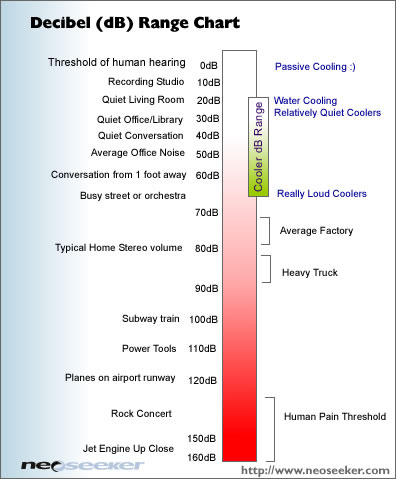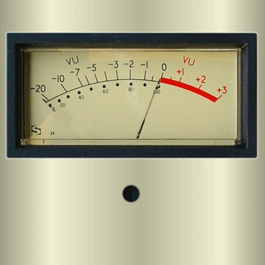It All Boils Down To Two Things...
It All Boils Down To Two Things...
The world of sound all boils down to two things: how loud it is and what the size (frequency) of its movement is. Let’s start with loudness (volume). The loudness of audio is measured in decibels - a nod to the original audio dude, Alexander Graham Bell. Before Mr. Bell started to experiment with audio transmission and reproduction, there was no scale to measure acoustic energy, so Bell came up with his own scale to measure how loud a given sound was. He called his scale the Bell scale. Go figure! His instruments were crude and his 1-10 scale was not very fine or accurate. We still use his scale today, but we have increased the sensitivity ten fold (that’s where the deci part of decibel comes from); in other words, what Bell would have measured to be 7 bells, we now call 70 decibels. In fact, Bell would have measured any sound between about 65 and 75 decibels at 7 bells ... like I said, it was a rough scale. The term "volume" actually came about because a measurement of acoustic loudness is in fact a measurement of the volume of air molecules put in motion. Let’s talk volume!

There are two "volume" unit measurements (VU). The first is acoustic volume; this is referred to as dB-SPL, or decibels of sound pressure level. This is a measurement of the number of air molecules banging into each other (see last weeks blog). See the associated graphic for a run down on the dB-SPL scale. The other measurement is a voltage equivalent - this is the number you see represented on VU meters on a piece of audio equipment. This scale can be dBv, dBV, or dBm, these are various standards that all reference where "zero" is a little differently. The thing to remember is that they are all referring to how strong an electrical signal is, which will eventually determine how loud something will be when it’s converted back into acoustic energy. This brings us to transducers!

A transducer is something that converts energy from one form to another. Microphones, for instance, convert sound into electricity, and speakers convert the electricity back into sound. In the world of audio, conversions often occur several times before we "hear" something. Wrap your mind around this: A band plays live (measured in dB-SPL), the sound is picked up by microphones whose elements move in response and convert (transduce) the moving air molecules into electricity (dBv), which is then converted into ones and zeros (A/D conversion) for storage and manipulation. Then, when played back, these ones and zeros are converted back to an electric signal (D/A conversion) which is sent to an amplifier that brings this signal up to a level which is capable of making a speaker move, and through the movement of the speaker the electric signal is finally converted (transduced) back into it’s original form (dB-SPL). I’ve just described the chain of events that happens to most pre-recorded music before we hear it. That’s a bunch of conversions! Four times the original sound is converted into a totally different form. Along the way, if any one of these conversions is done poorly the result will be inaccurate reproduction of the original sound (i.e. yucky). Oh, and then of course our ears actually transduce that sound back into an electric signal for our brains to process. If your ears are damaged and incapable of accurately accomplishing this final conversion, then all the other conversions won’t really matter to you, cause you can’t hear it anyway! So see last week’s blog, and darn it, protect those ears!
Okay you electric guitar players out there: think about the transducers in your signal chain. The guitar produces a small acoustic signal that the pickup transduces into a small electric signal which your amp brings up to a level that can then move your speaker(s) which ultimately transduce the electric energy back into acoustic energy and produce a measurable amount of SPL. The three pieces of this signal chain (the pickup, amp, and speaker) all influence the final outcome (quality) of your sound. Is any piece more important than another? Personally I think the speaker probably wins by a hair in this debate. Why? I promise I’ll get to that in a couple of weeks! For now, I must say so long. Next week we’ll finish up on volume and talk about the frequency of sound. You’re gonna love it, trust me.
- VAUGHN SKOW's blog
- Log in or register to post comments


Thanks Vaughn for the info. I am just learning about sound so reading your blogs will be very useful. Hopefully my post will also get more interesting. All we can do is hope.
I know after reading this blog, I understand more about the history of where dB and VU meters come from. Also, I understand even more about the different transducer steps audio and sound goes through before our ears hear anything. This was my first time checking out this blog, but it won't be my last time.
I found this to be informative and helped give me a clearer understanding of the conversions of sound back to sound. It also reinforced what you have covered in class.
This was very helpful in reinforcing what you have covered in class. It was nformitive and gave me a better understanding how recorded. sound is converted back to sound
The blog helped emphasis what we learned towards the beginning of class. It connects topics such as the dB scale, 1s and 0s, A/D converter, storage, and the D/A converter. With so many conversions each time, it is important to have all the right connections, cables, equipment, and knowledge of how to actually use all of those.
The blog helped emphasis what we learned towards the beginning of class. It connects topics such as the dB scale, 1s and 0s, A/D converter, storage, and the D/A converter. With so many conversions each time, it is important to have all the right connections, cables, equipment, and knowledge of how to actually use all of those.
This blog was very good on explaining the different ways audio, and a guitar sound is transduced before we even get to hear the sound through monitors or headphones. Also it help me understand the difference evn more between dB and VU meters too! This was my first time checking out the blog, but I will be checking out and reading more information that can help me understand and improve my skills in audio and music production.
This is the first blog I've ever answered or commented on. And I'm learning lots of things I didn't know...like, I knew Alexander Graham Bell invented the first phone, but I didn't know about his Bell Scale or where the word 'decibels' (bells) came from. I'm also learning to be careful when getting too close to rock concerts or jet planes. A friend of ours is a retired bass player, who blames his bad hearing on being too close to the drums and his drum amps for too many years, and a drummer we met (who was Gary Lewis and the Playboys drummer) said he lost his hearing from wearing Koss headphones and having the volume way too loud for too long. So, I will be careful with my ears. I also like the explanation of how many times the original sound is converted/transduced before it even gets to my ears where my brain will convert it again. Now when I'm at a concert, and hearing the band play, I will think about how the microphones pick up the sound, converting it to electricity (dBv), which is converted into ones and zeros to be manipulated later when played back, then converted back to an electrical signal, and then sent to an amp to increase the signal's level which is capable of making the speakers move, and that it's that movement that converts it back to it's original form (dB-SPL). I'm seeing that it's all related and connected, and also how every piece of equipment in the chain is equally important. As I learn about the recording process, broken down like this, it starts to become less intimidating for me, walking into a fully equipped studio, when you have very little experience.
This is amazing. Im not a fan on bloging but this is something that i can truly say i've learned something from. i had know idea that Bell was the creator ;of the scale. and just from reading this it gave me clarity and a understanding on dB and vu.. i enjoyed reading this.. GOOD STUFF.. :)